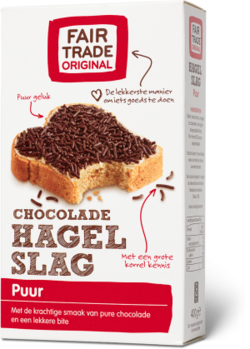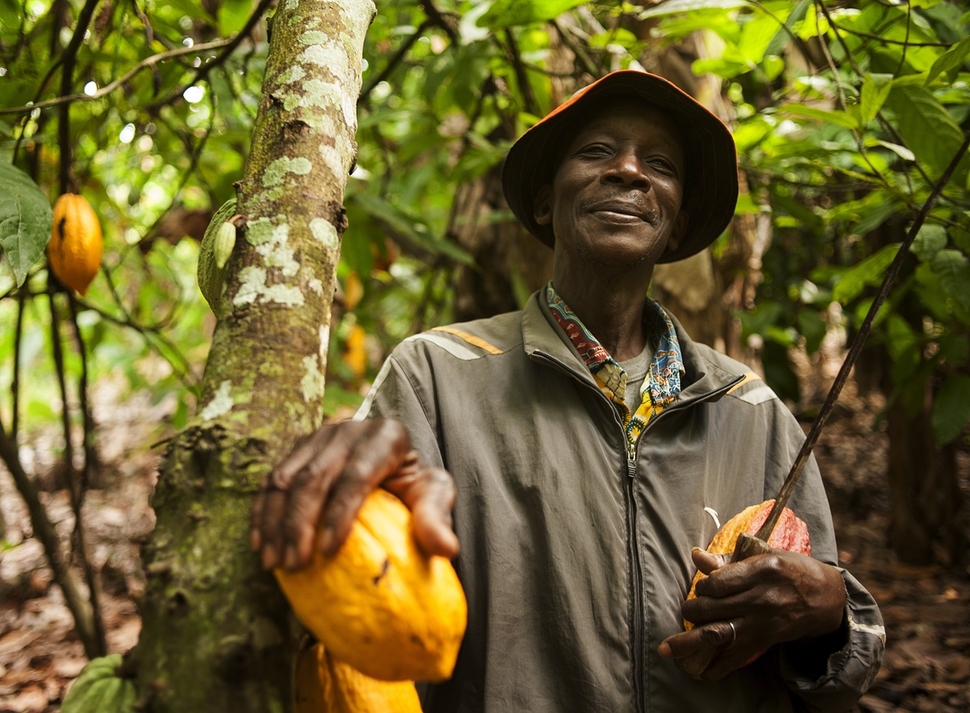As a proper Dutchie, I love hagelslag. I eat it every morning and I cannot imagine a better start of the day. And hagelslag is not the only form of chocolate I consume. Failed an exam? Bar of chocolate gets me going again. Cold winter day? Big mug of hot chocolate topped with cream to keep me warm. Not to mention brownies, chocolate chip cookies, M&M’s… And I’m not the only one: Dutch people annually eat around 5 kg of chocolate per person.
Keeping this fact in mind, you’d be surprised that most Dutch people don’t recognize a cocoa fruit when they see one:
This is because cocoa is grown far away from us, around the equator in countries like Ivory Coast, Ghana, Indonesia and Nigeria. We only get to see the final product. But this works the other way around as well: most cocoa farmers have never tasted chocolate in their lives, and often they don’t even know what their cocoa beans are processed into, as this amazing reportage shot in Ivory Coast shows:
The sad truth is that this will probably stay this way. Chocolate is a luxury product: the production process is simply too costly relative to the nutritional value of the end product. A bar of chocolate in Ivory Coast costs €2, while the farmer in the video only makes €7,50 a day (with which he takes care of a family of 15 and pays 4 laborers). Chocolate therefore cannot be turned into a so-called frugal innovation: a high quality product or service that, when stripped down or re-engineered, can be offered at very low prices to people at the “Bottom of Pyramid” (BoP). The BoP consists of the 4 billion people around the world that live from less than $2 a day.
Even if the production costs of chocolate would be decreased, for example by reducing cocoa solids content or by substituting cocoa butter with another fat, people in the BoP would never spend their money on something like chocolate; they would rather buy something that is useful and that will last, instead of something that just tastes good and is finished before you know it.
But if we can’t make chocolate frugal, what we could try is make the chocolate industry a responsible one. Currently, the cocoa production process faces many problems. Farmers often do not have a stable income and are forced to sell their cocoa for bottom prices to the intermediaries. There is no attention for good working conditions. An astonishing amount of children work on the plantations. Ivory Coast, supplying 40% of the world’s cocoa, uses an estimated amount of 200,000 children as laborers in its production process, of which up to 12,000 may be victims of trafficking or slavery. Needless to say, they often work long hours under hazardous conditions and are not able to go to school.
First step in making the chocolate industry responsible is increasing the percentage of chocolate with a fair-trade certificate. Chocolate with a fair-trade certificate is the only chocolate that guarantees fair prices for cocoa and a good trading position for small cocoa farmers, which means fair-trade chocolate is inclusive towards poor producers. It also guarantees good working conditions for the laborers (certainly no child labor) and sustainable cocoa production, and is therefore responsible. On top of that, around 50% of all fair-trade cocoa sold worldwide is also certified organic. Although the worldwide sales of fair-trade certified cocoa is rapidly growing over the last decade, it still accounts for only a fraction of worldwide cocoa consumption, estimated at 0.1%.
How to increase this percentage? There are many options, among which are government regulations, marketing, awareness campaigns…
But for now, let me try to create a little bit of this awareness among you: don’t you agree that the only way you can really enjoy chocolate, is by knowing that it was produced in a responsible and inclusive way? And then, maybe, those cocoa farmers will be able to taste chocolate themselves one day.

